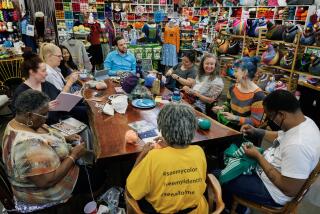Needleworkers Take Issue With Story’s Tone, Terms
* I was incensed by the repeated characterizations of needlework artists and hobbyists as “aging,” “grandmotherly” or “octogenarians” [“Is Stitch Online a Crime?,” Aug. 1]. I am a thirtysomething Internet producer who does needlework, and I know scores of other needleworkers in their 20s and 30s.
MARY PLATT
Costa Mesa
*
* Contrary to the slant of the article, many design companies are small, home-based businesses operated by one or two people working long hours on shoestring budgets. A single design pattern can represent months of work and a significant investment for the company. Even if the design company is large, copying their patterns and sharing them with others is still theft.
KATHLEEN M. DYER
Livermore
*
* I am surprised that Carly Conry, who seems totally blase about copyright law, is portrayed in a positive light, while stitchers who respect copyright law are described in sarcastic, demeaning terms (e.g. “spies,” “clucky,” “aging”).
SUSANNAH TILLER
Newcastle, Australia
*
* For all the “sharing” enthusiasts’ complaints of expensive designs, you’ve neglected to point out that those people who complain about having to pay $6 for a design (which is usually sold as a single design in leaflet form, not in a book) are still buying $40 worth of fabric to stitch the design on and then spending $100-plus to have the pirated design framed.
TERI RASMUSSEN GEORGE
London, Canada
*
* Two hundred years ago, most forms of art and knowledge were unavailable to the average civilian; it was just too expensive. The government and a small group of wealthy private citizens set up intermediary agencies. Libraries, concert halls and museums were created to give people access to what was essentially copyrighted material.
Although the intentions were noble, under this system, the creators of various forms of art are paid for their material only one time.
Today the technology exists so that material can be used and traded without having to go through an agency. What makes access to material through libraries and museums OK, but Internet access illegal?
Do people have the right to charge whatever they wish for material they have created, or must they make it accessible to everyone in order to serve “the greater good”? We have been debating this issue for thousands of years; this is just another variation of the same issue.
STUART SCHALLER
Valley Village
More to Read
The biggest entertainment stories
Get our big stories about Hollywood, film, television, music, arts, culture and more right in your inbox as soon as they publish.
You may occasionally receive promotional content from the Los Angeles Times.










